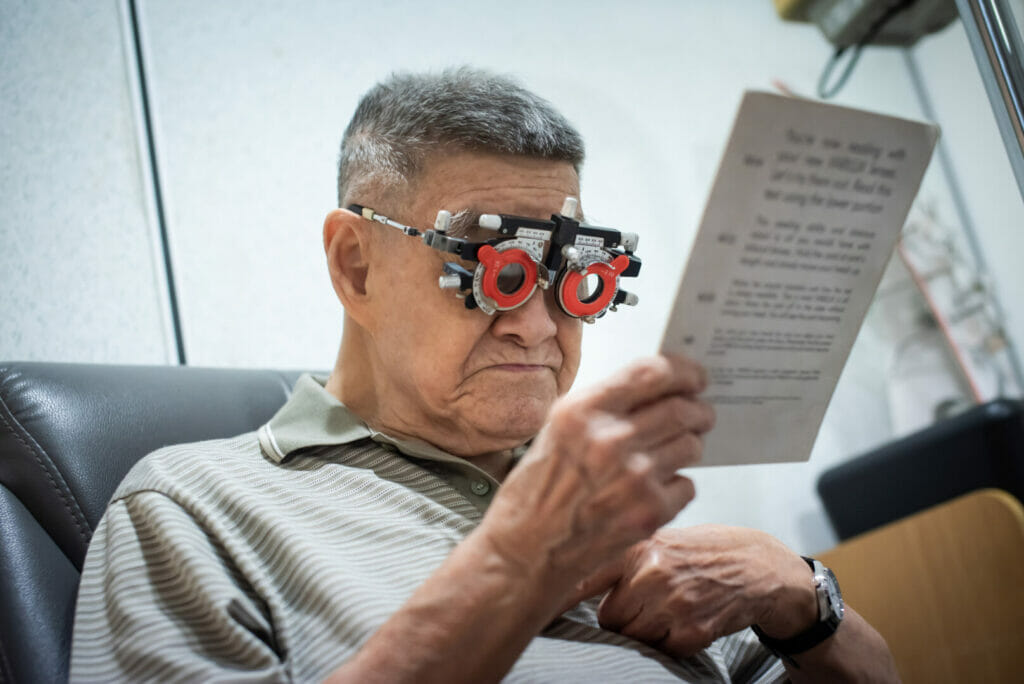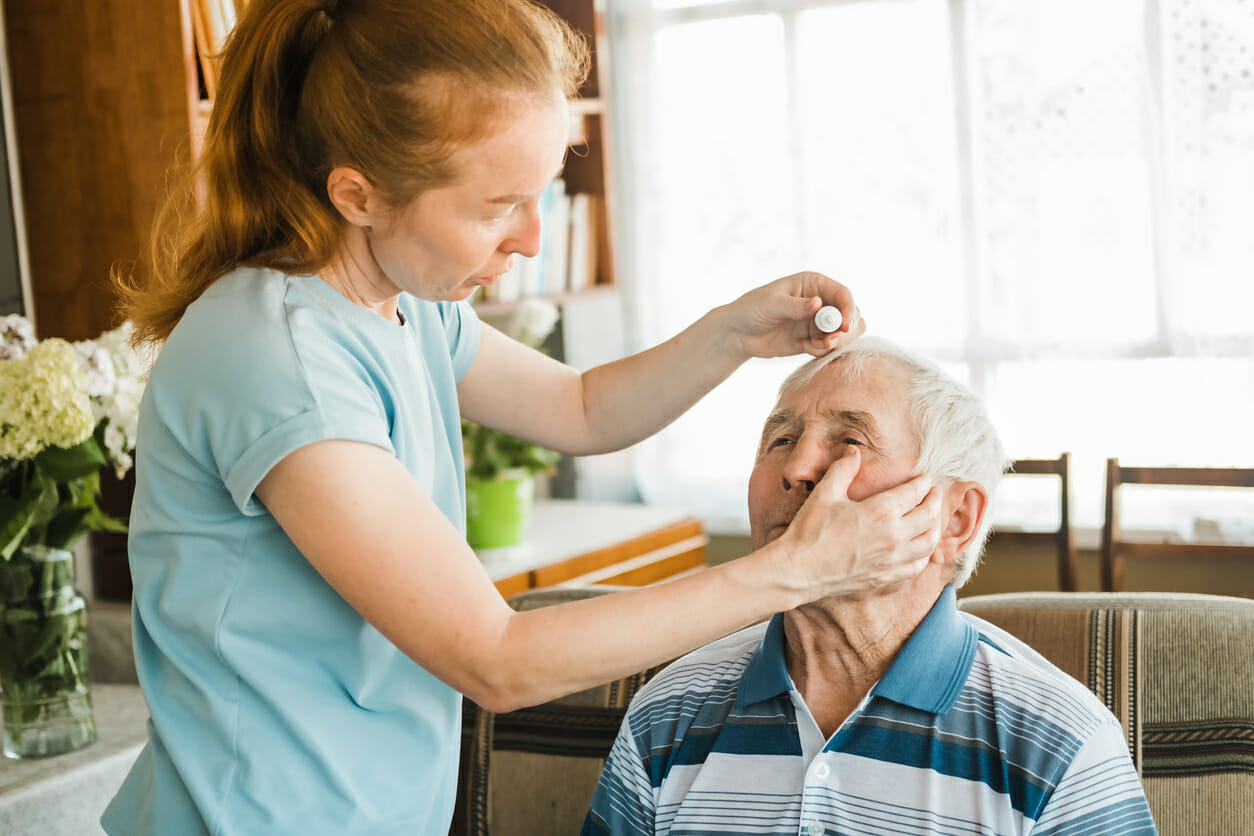Watching our loved ones age brings a mixture of emotions—pride in their wisdom, joy in the time spent together, but also concern for their well-being. One area that often gets overlooked as we age, but plays a crucial role in our loved ones' quality of life, is vision health, and eye care. Changes in eyesight like presbyopia, dry eyes, or an elevated risk of conditions like glaucoma or macular degeneration can profoundly affect their daily activities, independence, and even emotional health.
However, regular vision check-ups offer several advantages, including early detection of eye issues and potential indicators of other health conditions. World Sight Day, an annual event, raises awareness about eye health and provides opportunities to promote initiatives for seniors' eye care. By prioritizing vision health, we can enhance seniors' overall well-being and quality of life.
Vision Changes with Aging
Aging gracefully often involves embracing the changes that come with it, including those that affect our vision. For the seniors we hold dear, understanding these vision changes is essential for their overall well-being and quality of life. Here are common age-related vision changes:
Presbyopia
Presbyopia is one of the most prevalent age-related vision changes and affects our ability to focus on nearby objects. Reading small print, threading needles, or enjoying hobbies that require close-up work can become more challenging for seniors. This condition typically becomes noticeable around the age of 40 and continues to progress gradually. As loved ones, we can help by ensuring they have access to reading glasses or multifocal lenses to make these tasks more comfortable.
Reduced Pupil Size
With age, the muscles controlling pupil size become less responsive, resulting in smaller pupils. This change can lead to decreased sensitivity in low-light conditions, which may affect seniors' night vision. Encourage well-lit environments and offer assistance when necessary, especially during nighttime activities.
Decreased Tear Production
Aging can lead to reduced tear production and quality, resulting in dry eyes. Dry eyes can be uncomfortable and cause redness and occasional blurry vision. As caring individuals, we can suggest the use of artificial tears, encourage proper hydration, and recommend the use of humidifiers in dry indoor settings to alleviate these symptoms.
Increased Risk of Eye Diseases
Seniors are at an elevated risk of developing certain eye diseases, such as cataracts, glaucoma, and age-related macular degeneration (AMD). These conditions can have a significant impact on vision if left untreated. To support our senior loved ones, we should emphasize the importance of regular eye exams. Early detection and intervention can often prevent further vision loss.
Impact of Vision Changes on Seniors' Daily Life
The vision changes associated with aging can significantly impact seniors' daily lives in various ways:
- Independence: Seniors with vision changes may experience a decline in their independence. Difficulties in reading, recognizing faces, or navigating unfamiliar places can make them reliant on others for assistance.
- Safety concerns: Impaired vision can lead to safety hazards, especially when it comes to mobility. Seniors may be at a higher risk of falls and accidents, affecting their quality of life and overall well-being. Studies have reported a reduced quality of life in individuals around 65 years old due to vision loss.
- Social isolation: Struggling with vision changes can lead to social isolation, as seniors may avoid social gatherings or outings due to fear of embarrassment or discomfort caused by their vision difficulties.
- Mental health: Vision changes can take a toll on seniors' mental health. Feelings of frustration, anxiety, and depression can arise from the challenges they face in performing daily tasks.
However, it's essential to remember that many of these vision changes can be managed or mitigated through regular vision check-ups and appropriate interventions.
Eye Care Tips for the Health of Your Senior Loved Ones
Caring for the eye health of your senior loved ones is an act of love and support that can greatly enhance their quality of life. By following these tips and being proactive in their eye care, you can help ensure that they enjoy clear sight and a comfortable, fulfilling life as they age. We recommend consulting healthcare professionals for personalized advice and guidance tailored to their needs.
Encourage Regular Eye Exams
Routine eye exams are crucial for seniors. Encourage your loved ones to schedule regular appointments with an eye care professional. These exams can detect age-related eye conditions early, allowing for timely intervention and treatment.

Create a Vision-Friendly Environment
Make their living space more vision-friendly by following the recommended steps:
- Effective Lighting: Install bright, energy-efficient bulbs and task lighting where needed. Ensure easy access to light switches, and consider glow-in-the-dark switches.
- Glare Control: Use window coverings to reduce glare, and apply anti-reflective coatings to eyeglasses.
- Contrast and Color: Maintain contrasting colors between furniture, walls, and floors for improved visibility.
- Safety First: Remove tripping hazards, secure rugs, and add handrails and grab bars where necessary.
- Natural Light: Embrace natural light during the day by keeping windows clean and curtains open.
- Regular Maintenance: Replace dim or burnt-out bulbs promptly, and keep reflective surfaces clean.
Manage Chronic Health Conditions
Help manage chronic health conditions like diabetes or high blood pressure, which can affect eye health. Encourage them to adhere to their prescribed medications and dietary guidelines, as well as to monitor their health regularly.
Promote a Balanced Diet
Support a diet rich in eye-healthy nutrients. Include foods like leafy greens, carrots, and berries in their meals. Consider discussing dietary changes with their healthcare provider to address specific nutritional needs.
Eye-Healthy Nutrients
- Vitamin A: Encourage foods rich in vitamin A, such as leafy greens (like spinach and kale), sweet potatoes, and carrots. Vitamin A is essential for maintaining good vision.
- Vitamin C: Include fruits like oranges, strawberries, and kiwi in their diet. Vitamin C supports the health of blood vessels in the eyes and may reduce the risk of cataracts.
- Vitamin E: Foods like almonds, sunflower seeds, and spinach are excellent sources of vitamin E, which can help protect the eyes from age-related damage.
- Zinc: Zinc is found in foods like lean meats, poultry, and whole grains. It plays a role in maintaining the health of the retina and may help prevent age-related macular degeneration (AMD).
- Omega-3 Fatty Acids: Fish like salmon, mackerel, and sardines contain omega-3 fatty acids, which have been linked to a reduced risk of dry eyes and AMD.
If your senior loved ones need assistance with meal planning and preparation, consider helping them or arranging for meal delivery services that offer nutritious options. A balanced diet not only supports eye health but also contributes to overall well-being, energy levels, and vitality. By incorporating these eye-healthy foods and considering individualized dietary recommendations, you can play an essential role in helping your senior loved ones maintain clear vision and optimal eye comfort as they age.
Hydration and Eye Care
Dehydration can contribute to dry eyes. Encourage your loved ones to stay hydrated throughout the day. If they experience dry eyes, consider using lubricating eye drops to relieve discomfort.
Dehydration and Dry Eyes
- Dehydration and tear production: Dehydration can directly impact the production of tears, leading to dry eyes. Tears are essential for maintaining eye health, as they provide lubrication, nourishment, and protection to the eyes.
- Symptoms of dry eyes: Seniors experiencing dry eyes may notice symptoms such as a gritty or burning sensation, redness, excessive tearing (a reflex response to dryness), sensitivity to light, and intermittent blurred vision.
- Chronic dry eyes: For some seniors, dry eyes can become a chronic issue, affecting their comfort and vision. Chronic dry eyes may result from aging, certain medications, medical conditions, or environmental factors.
Encourage Hydration
- Regular water intake: Emphasize the importance of regular water intake throughout the day. Seniors should aim to drink at least eight glasses (64 ounces) of water daily unless advised differently by their healthcare provider.
- Balancing fluid intake: While water is crucial, seniors can also stay hydrated by consuming hydrating foods such as fruits (e.g., watermelon, and oranges) and vegetables (e.g., cucumbers, and celery).
- Hydration reminders: Remind your loved ones to drink water regularly, especially if they have a tendency to forget or if they rely on caregivers for assistance.
Screen Time Awareness
Help them manage screen time, especially when using computers, tablets, or smartphones. Adjust font sizes and screen brightness for better visibility and encourage frequent breaks to reduce eye strain.
Smoking Cessation Support
If your senior loved one is a smoker, offer support and resources to help them quit smoking. Smoking is a major risk factor for several eye conditions, and quitting can improve their eye health and overall well-being.
Regular Physical Activity
Engaging in regular physical activity can improve overall health, including eye health. Encourage them to stay active with activities suitable for their fitness level, which can promote better circulation and eye health.
- Seated exercises: Suggest gentle seated exercises like leg lifts, seated marching, and seated arm circles. These activities can help improve blood circulation without putting too much strain on joints.
- Breathing exercises: Encourage deep breathing exercises, like diaphragmatic breathing, which can be done while sitting. Proper breathing techniques support relaxation and better oxygen circulation.
- Short walks: For seniors who can walk short distances, regular strolls in a safe and familiar environment can provide gentle exercise and fresh air. Ensure they have proper walking aids if needed.
- Balance exercises: Simple balance exercises like standing on one leg with support can help improve stability and reduce the risk of falls, ultimately benefiting eye health.
- Eye exercises: While not a form of physical activity, encourage seniors to do eye exercises to improve focus and eye muscle strength. This can include rolling their eyes, focusing on near and far objects, and blinking regularly.
Conclusion on Eye Care Tips: A Clear Path to Brighter Days
Caring for the eye health of our senior loved ones is a testament to the love and support we hold for them. By understanding the vision changes that come with aging and following these proactive measures, we can help them embrace their golden years with clarity, comfort, and confidence. Their eyes are windows to a lifetime of memories, and with our guidance, they can continue to see the beauty and wonder of the world around them.
Let's be their guiding light on this journey, ensuring that their days are filled with brighter, clearer, and more joyful moments. In doing so, we gift them not only with improved vision but also with the assurance that we are always by their side, helping them navigate life's pathways with grace and care.





